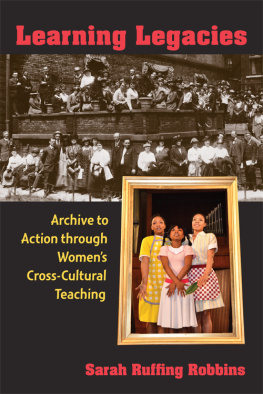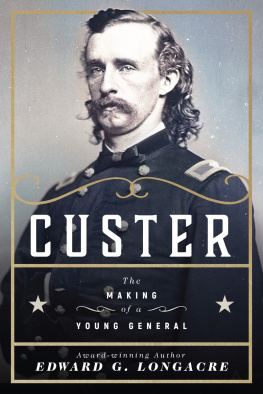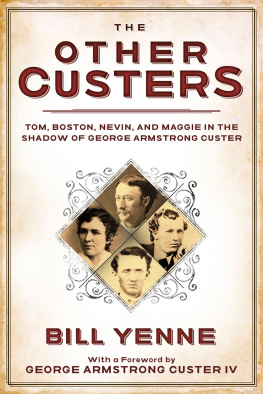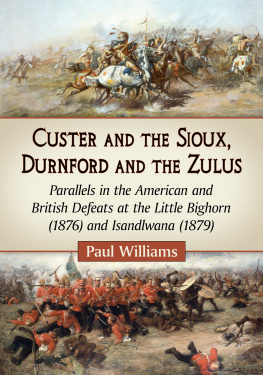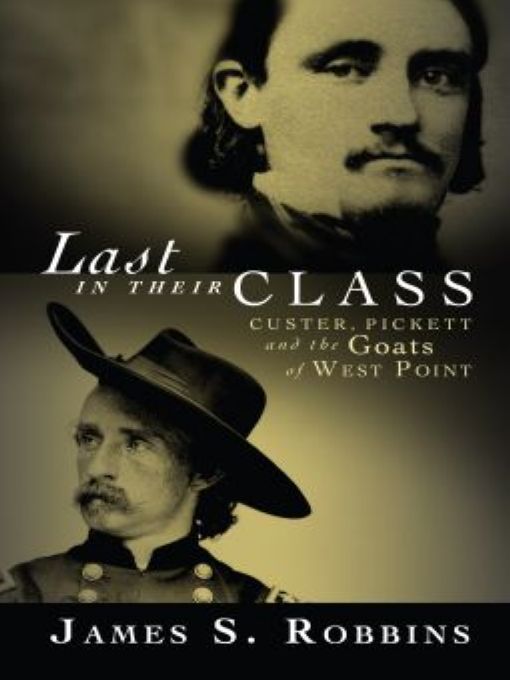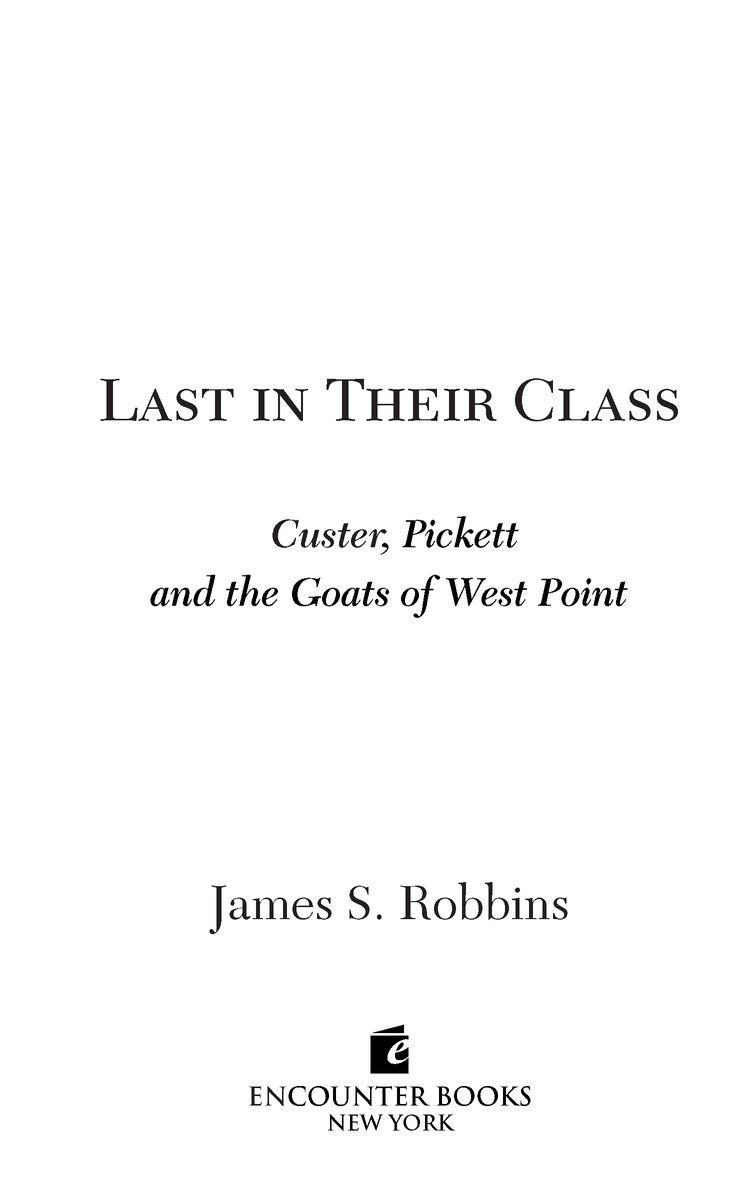Table of Contents
To E.L.R., USMA 1992
Not the Goat
INTRODUCTION
THE SPIRIT OF THE GOAT
My career as a cadet had but little to commend it to the study of those who came after me, unless as an example to be carefully avoided.
George Armstrong Custer United States Military Academy, Class of June 1861
THE UNITED STATES MILITARY ACADEMY at West Point is an institution committed to excellence, which strives to equip each cadet with the knowledge and the leadership skills they will need to be Army officers and to fight and win our nations wars. Yet at West Point graduation ceremonies, no cadet is applauded louder than the graduate with the lowest grades, the Goat.
Graduating last at West Point is not a badge of shame but a mark of achievement. Id rather be last man on a first-rate team, said one Academy graduate, than first man on any other. Particularly in the nineteenth century, when graduating classes were smaller and attrition rates were much higher, the Goat was seen as a survivor. No Goats stayed at the bottom of their classes for four years straightmost of those who had stood below them flunked out by graduation. As well, given the subjectivity of grading and the caprice of circumstance, being the Goat was as much a function of luck as one of ability. Coming in last in the class was thus something earned, but also fated. The same is true in war: bad breaks can disrupt the best plans, while good luck and individual effort can bring unexpected victory. Ill fortune can make a Goat, but a Goat can make himself a hero.
The Goat of the Class of 1862, Charles Nelson Warner, was simply glad to have the chance to serve. He had failed an exam in 1861 (due in part to one of George Custers stunts) and had been sent home to Pennsylvania. But at the onset of the Civil War, he was given a second chance. If I conduct myself properly, Warner wrote his sister, I have a chance yet to outstrip those who have excelled me here. I mean to be temperate, prompt, faithful, persevering, never shirking from my duty. After he graduated, Warner had his baptism of fire at the Battle of Antietam, and then proved his devotion to duty with a heroic stand at Chancellorsville.
Warner was the type of Goat who struggles with his studies, finds himself in over his head, but hangs on to graduate at the very bottom. Discipline and hard work are as important as intelligence at West Point, maybe more so. James E. B. Stuart, the Confederate cavalry general who graduated thirteenth in the Class of 1854, noted that success at West Point was not guaranteed by high intellect, nor denied those who were not so gifted. For one to succeed here, he wrote on Christmas Day of 1851, all that is required is an ordinary mind and application; the latter is by far the most important and desirable of the two. For men of rather obtuse intellect, by indomitable perseverance, have been known to graduate with honor; while some of the greatest geniuses of the country have been found deficient, for want of application, Edgar A. Poe for instance.
Poe could have excelled academically at West Point if he had cared to, but he was not interested in adopting the Academys monastic way of life and was forced to leave after half a year. James McNeill Whistler, another great American artist and a second-generation West Pointer, made it until his third year before washing out. Both were of a different type than Warner, intelligent and talented cadets to whom grades and class rank were less important than pranks, socializing and other pursuits. The 1909 Howitzer yearbook, for example, defined the Goat as a man who would have stood first if he had boned (i.e., studied). George C. Strong, USMA 1857, who graduated fifth in his class, said, It is a favorite idea among many here that it requires an abler man to stand at the foot of his class throughout the course than at the head of it. The Goat will study only enough to get by day to day, and then before exams will spend one or two days or nights of intense application, cramming just enough to ensure success. Strong added, these are some of the symptoms of that epidemic which is called Genius.
These were men like George Custer, George Pickett and Henry Heth, who might well have excelled at their studies had the pursuit of knowledge been more compelling than the lure of good times. They and their comrades lived on the edge, seeking new and inventive ways of skirting the rules, and rising to the occasion only when the situation absolutely demanded it. They were cut from the same cloth as Cadet William A. Beach of Indiana, of the Class of 1910, whom the Howitzer described as an Immortal of the old school; he is a goat from choice to be sure, and never bones because he thinks it is vulgar to work.... Many of his goaty companions have had grave fear for his welfare during exams, but on such occasions his true immortal characteristics loom up and he passes the cleanest exam in the class.
The term the Immortals originated in the early nineteenth century and referred to any cadets in the lowest academic section. Brigadier General John C. Tidball, USMA 1848, who was Commandant of Cadets in 1864, noted that the Immortal section contains those who are hanging on at the ragged edge of deficiency. The derivation of the term is obscure; it may rest with Herodotus, who wrote of a 10,000-man body-guard of the ancient Persian kings called the Immortals because their numbers never diminished. Likewise, the number in the last section was constant; when those at the bottom failed, those who remained at the tail end of the class became the new last section.
Goats and Immortals were originally synonymous, referring to anyone close to the bottom of the academic rankings. Like the Immortals, there is no known record of the origin of the term the Goat, but it is most likely a later invention. The earliest written reference is in the booklet for the Hundredth Night entertainment of February 20, 1886, a celebration traditionally held one hundred days before graduation. One of the jokes reads, What feature of the instructor of the Immortals in Spanish resembles his section? His beard; it is a goatee, and so is his section. Thus while George Custer and George Pickett are the most famous Last Men in the history of the Academy, it is unlikely they were ever referred to as Goats while they were cadets.
The term goat connotes many thingsstubbornness, persistence, but also mischievousness and playfulness. The Goats were by and large charismatic, adventuresome, with a youthful bonhomie that generally made them very popular with their classmates. Goat is also slang for someone who fails at an important task or takes blame, especially in the context of scapegoat. In Biblical times, the scapegoat was brought to the door of the tabernacle, where a high priest would place his hands upon it and lay the sins of the people on the animal. The goat would then be banished to the wildernessas the majority of nineteenth-century cadets were, particularly the lower-ranking graduates. A more pointed Biblical reference is in Matthew 25, which tells that God will separate the righteous from the unrighteous as a shepherd divideth his sheep from the goats. The former are granted life eternal; the latter go away into everlasting punishment. The expression to play the goat referred to someone who acted silly in order to make others laugh, and the goat was also a classical symbol of lust and excess. Both fit the pattern, since the Goats of West Point have always been noted both for frivolity and for their way with the opposite sex.




